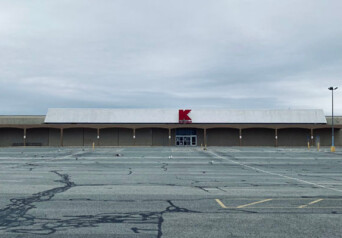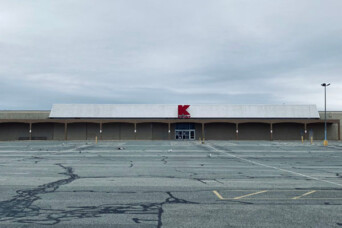Small Business Advocacy Thinking outside the (big) box
Big-box stores lead to job loss, lower tax revenue, and a decline in economic activity. We should support our local businesses instead which are much more beneficial to the communities they are a part of.

- Post Date
- Tue, May 3
- Small Business Advocacy
We spend a lot of time talking about how damaging shopping on Amazon can be to small businesses and to local economies (see here, here, here, here, and here). And although the online behemoth is one of the greatest threats to independent businesses, it is only fair we take a look at an older but still present antagonist that continues to damage small business and job growth, and cause harm to cities, towns and local communities across the country: Big Box Stores.

Since the 1990s large chains like Wal Mart, Lowe’s, Home Depot and Target have been peddling to municipal officials and town residents that they are necessary and good for continued economic development and growth. And it appears local and state governments have bought what they’re selling.
Across the country they have gone to extreme measures to woo these corporations to their communities, granting at least $2.6 billion in subsidies to just six large retailers, all the while putting locals at a distinct disadvantage and even out of business.
But as it turns out, their sales pitch doesn’t always represent the reality.
The Pitch: Big Box Stores bring jobs
When there’s news of a box store coming to town, one of the most common endorsements for the project is that it will bring more jobs to the area.
The Reality: Big Box Stores cause job loss
A study by independent economists examined 3,094 counties across the U.S. and tracked the arrival of Wal-Mart stores between 1977 and 2002 found that big-box stores eliminate more retail jobs than they create. The study found that opening a Wal-Mart store led to a net loss of 150 retail jobs on average.
Regardless of where a new box store chooses to locate, it doesn’t increase the amount of disposable income in the community. So, any money spent in the new box store is likely money that would have been spent in an existing business, causing overall revenue to drop for that business, which could lead to downsizing or closure (job loss).
The Pitch: Big Box Stores will generate more tax revenue
Another “benefit” touted by large corporate retailers and chain restaurants is that their low-density development will be a major municipal revenue generator.
The Reality: Big Box Stores come with high costs
Big box stores have oft been referred to as a Ponzi scheme, providing the illusion of prosperity, while in actuality they cost more than they generate for localities; they are expensive to maintain, requiring more in the way of public services, infrastructure, and maintenance like police forces, sewers, and roads.
A 2002 study in Barnstable showed that big-box retail costs taxpayers more than they produce in revenue, finding that big box retail generates a net annual deficit of $468 per 1,000 square feet, compared to the $326 per 1,000 square feet that small-scale Main Street businesses returns to public revenue (note: we recognize the study is twenty years old, and we have made a request for Barnstable to update it).
What’s more, these large corporations look for property tax and other loopholes wherever they can find them, which can cost state and local governments hundreds of millions of dollars a year in lost revenue.
The Pitch: Big Box Stores will bring prosperity
Corporations push the idea that locating in a community will inevitably lead to further economic development and activity.
The Reality: Big Box Stores lead to a decline in economic success
Trading independent retailers for chains actually shrinks the level of economic activity in local economies. One study of 116 cities in California found that the presence of a big-box store did not correspond to increased sales tax revenue. Love Live Local’s own Local Matters report shows that Cape Cod retailers and restaurants recirculate 2-4 times the amount of their revenue into the local economy when compared to their corporate counterparts. It also shows that an overall shift of spending from a corporate retailer to local retailers would result in an additional $112 million in annual income for the local economy.
The Pitch: Big Box Stores build impressive super stores
There is usually a lot of excitement when a chain store breaks ground or holds a ribbon cutting ceremony at a new location – something so shiny and new brings with it a lot of promise, and people are impressed with the grandiosity of their store designs.
The Reality: Big Box Stores leave a blighted landscape
The structures built by box stores should really be considered as single-use and disposable. When a chain store or restaurant decides to vacate a property, often after only a few years, the huge and highly specific space can rarely be repurposed or used by another business, leaving a huge empty and ugly hole for years in the built landscape (think Sports Authority or Kmart in Hyannis). On the other hand, downtown commercial spaces can sustain a wide variety of uses – the design is flexible and adaptable, so when a tenant leaves, the space can be filled in no time.
The reality is Big Box Stores are not all they’re cracked up to be. It is time to stop welcoming them into communities with open arms, and it is definitely time to stop incentivizing them in any way with subsidies and tax breaks. Instead we should be thinking about how we as communities can help our locally owned, independent businesses grow and thrive.
Thank you to our 2022 Mission Supporters Mid-Cape Home Centers, Cape Cod Five, Cape Cod Healthcare, Nauset Disposal and Duffy Health Center for sustaining this educational + advocacy work.
Related articles
- Post Date
- Sat, Aug 31
- Small Business Advocacy
- Post Date
- Wed, Aug 21
- Small Business Advocacy

